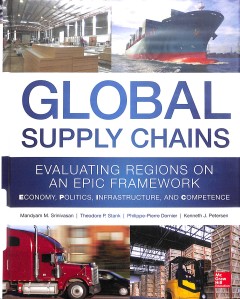Ditapis dengan

Global supply chains : evaluating regions on an EPIC framework
A proven framework for measuring the supply chain potential of geographic regions Managing a complex global supply chain requires a strategic assessment of the various factors that can affect decisions on procurement, manufacturing, warehousing, logistics, distribution, and sales. Co-written by renowned experts in global supply chain management, this book presents a systematic, structured appro…
- Edisi
- -
- ISBN/ISSN
- 978-0-07-179231-8
- Deskripsi Fisik
- xx, 476p.; 25cm.
- Judul Seri
- -
- No. Panggil
- TXT LO SRI g

The new supply chain agenda: a synopsis and directions for future research
The purpose of this paper is first, to summarize the findings from the book The New Supply Chain Agenda (Slone, Dittmann, and Mentzer 2010). Second, it reviews associated academic research, identifies critical knowledge gaps, and suggests areas for future academic research that will aid scholars and managers in improving supply chain management (SCM) performance.
- Edisi
- Vol. 41 No. 10, 2011
- ISBN/ISSN
- -
- Deskripsi Fisik
- 19 p.
- Judul Seri
- International Journal of Physical Distribution & Logistics Management
- No. Panggil
- ATC LO AUT t

Organizational structure- influence on logistics integration, costs, and info…
Organizational structure significantly influences firm performance. A recent survey of logistics professionals revealed that centralized structures accommodated logistics system integration better than decentralized structures. Also, centralized firms spent a lower percentage of net sales on logistics costs and information system support costs than decentralized firms. On the other hand, no sig…
- Edisi
- Vol. 5 Issue: 2, pp.41-52
- ISBN/ISSN
- -
- Deskripsi Fisik
- 14 p .
- Judul Seri
- The International Journal of Logistics Management
- No. Panggil
- ATC LO GUS o

Information exchange, responsiveness and logistics provider performance
The impact of information exchange on suppliers' performance is investigated in the context of trade relationships formed between manufacturers and third party providers of international logistics services. A conceptual model that predicts the important linkages among information exchange, responsiveness and performance is introduced and tested. The research shows that information exchange posi…
- Edisi
- Vol. 7 Issue: 2, pp.43-58,
- ISBN/ISSN
- -
- Deskripsi Fisik
- 18 p.
- Judul Seri
- The International Journal of Logistics Management
- No. Panggil
- ATC LO ELI i

Applying the strategy-structure-performance paradigm to the supply chain envi…
The paper extends a central paradigm of the strategy literature to the supply chain environment to foster a better understanding of the elements characterizing strategic decisions that lead to supply chain structural development and performance.
- Edisi
- Vol. 16 No. 1, 2005
- ISBN/ISSN
- -
- Deskripsi Fisik
- 27 p.
- Judul Seri
- The International Journal of Logistics Management
- No. Panggil
- ATC LO STA a

Computerization- Supporting Integration
Fast and flexible low-cost data processing and information systems have transformed business operations. Through enhanced information availability, leading manufacturers have accelerated the flow of their products to create competitive advantage based on speed. These companies have developed methods to channel the power of information in order to use organizational resources more effectively an…
- Edisi
- Vol. 24 No. 1, 1994, pp. 11-16
- ISBN/ISSN
- -
- Deskripsi Fisik
- 8 p.
- Judul Seri
- International Journal of Physical Distribution & Logistics Management
- No. Panggil
- ATC LO STA c

Insights from a logistics partnership
Highlights insights gained from five years of operating experience in a logistics partnership between a large US retailer and a provider of international logistical service. The insights gained from this partnership show that a third-party logistics provider can help a firm achieve substantial results. The path to achieving these results is not without its difficulties, but many of these proble…
- Edisi
- Volume 6 . Number 1 . 2001 . 16±20
- ISBN/ISSN
- -
- Deskripsi Fisik
- 7 p.
- Judul Seri
- Supply Chain Management: An International Journal
- No. Panggil
- ATC LO STA i

Marketing/logistics integration and firm performance
Functional areas within a firm must effectively interact and work together to plan, coordinate, and implement strategic initiatives. Interfunctional integration is believed to be directly related to a firm's competitiveness and profitability. The current research was undertaken to gain a greater understanding of the association between interdepartmental integration and performance. Results of a…
- Edisi
- Vol. 10 Issue: 1, pp.11-24
- ISBN/ISSN
- -
- Deskripsi Fisik
- 18 p.
- Judul Seri
- The International Journal of Logistics Management
- No. Panggil
- ATC LO STA m

A framework for transportation decision making in an integrated supply chain
There has been little conceptual work that comprehensively examines the changing role of the corporate transportation function in the modern business environment. Successful managers today require a broad view of transportation management's role and responsibilities in an integrated supply chain. This paper clarifies the major transportation decision areas and introduces a framework that positi…
- Edisi
- Volume 5 . Number 2 . 2000 . pp. 71±77
- ISBN/ISSN
- 1359-8546
- Deskripsi Fisik
- 10 p.
- Judul Seri
- Supply Chain Management : An International Journal
- No. Panggil
- ATC LO STA a
 Karya Umum
Karya Umum  Filsafat
Filsafat  Agama
Agama  Ilmu-ilmu Sosial
Ilmu-ilmu Sosial  Bahasa
Bahasa  Ilmu-ilmu Murni
Ilmu-ilmu Murni  Ilmu-ilmu Terapan
Ilmu-ilmu Terapan  Kesenian, Hiburan, dan Olahraga
Kesenian, Hiburan, dan Olahraga  Kesusastraan
Kesusastraan  Geografi dan Sejarah
Geografi dan Sejarah